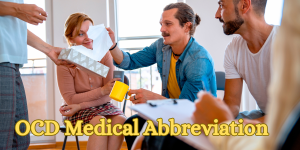OCD Medical Abbreviation
In the realm of mental health, the term “OCD” is widely recognized, but its medical abbreviation remains a mystery to many. Unravel the complexities of this abbreviation, diving into its nuances, causes, symptoms, and available treatments. Gain a comprehensive understanding of the condition and discover the path to effective management.
Demystifying OCD: What Does the Abbreviation Stand For?
To commence our journey, let’s unveil the meaning behind the abbreviation “OCD.” Delve into the origins of this term and how it encapsulates a mental health condition known as Obsessive-Compulsive Disorder. Understand the subtle intricacies that contribute to the uniqueness of this abbreviation in the medical lexicon.
The Landscape of OCD: Causes and Contributing Factors
Embark on a thorough exploration of the factors that give rise to Obsessive-Compulsive Disorder. Uncover the interplay between genetics, environmental triggers, and neurobiology, shedding light on the multifaceted nature of this mental health challenge.
Signs and Symptoms: Navigating the OCD Terrain
In this section, we dissect the manifestations of OCD, providing a detailed account of the varied symptoms that individuals may experience. Recognize the subtle cues and overt signals that signify the presence of Obsessive-Compulsive Disorder, fostering awareness and understanding.
Seeking Clarity: Diagnosis and Medical Assessment
Navigate the process of diagnosis and medical assessment for OCD, elucidating the methodologies employed by healthcare professionals. Gain insights into the crucial steps involved in identifying and confirming the presence of this mental health condition.

Treatment Modalities: Beyond the Abbreviation
Transition into the realm of treatment options for OCD, exploring therapeutic interventions, medications, and holistic approaches. Illuminate the path towards recovery and the diverse strategies employed to alleviate the burdens associated with Obsessive-Compulsive Disorder.
Coping Strategies and Lifestyle Modifications
Empower yourself or someone you know with practical coping strategies and lifestyle modifications. Uncover actionable tips for managing OCD on a day-to-day basis, fostering resilience and promoting overall well-being.
A Compassionate Approach to Mental Health
As we conclude our journey through the labyrinth of the OCD medical abbreviation, embrace a compassionate perspective on mental health. Equip yourself with knowledge, understanding, and empathy, contributing to a society that fosters support for those navigating the challenges of Obsessive-Compulsive Disorder.
Medication for OCD
Embarking on a treatment journey for OCD often involves medications tailored to address specific symptoms. Selective Serotonin Reuptake Inhibitors (SSRIs) and Tricyclic Antidepressants are commonly prescribed, aiming to regulate neurotransmitters. Medication for OCD It’s crucial for individuals and healthcare providers to collaboratively explore suitable medications, considering side effects and individual responses to optimize therapeutic outcomes.
Medication For Obsessive Compulsive Disorder
Addressing Obsessive-Compulsive Disorder through medication requires a nuanced approach. SSRIs, such as fluoxetine and fluvoxamine, stand as frontline treatments, modulating serotonin levels to alleviate symptoms. Medication For Obsessive Compulsive Disorder Tricyclic Antidepressants may also be considered. Individual responses vary, emphasizing the need for personalized treatment plans. Regular communication with healthcare providers ensures adjustments are made as needed, fostering a holistic and effective approach to managing OCD.





